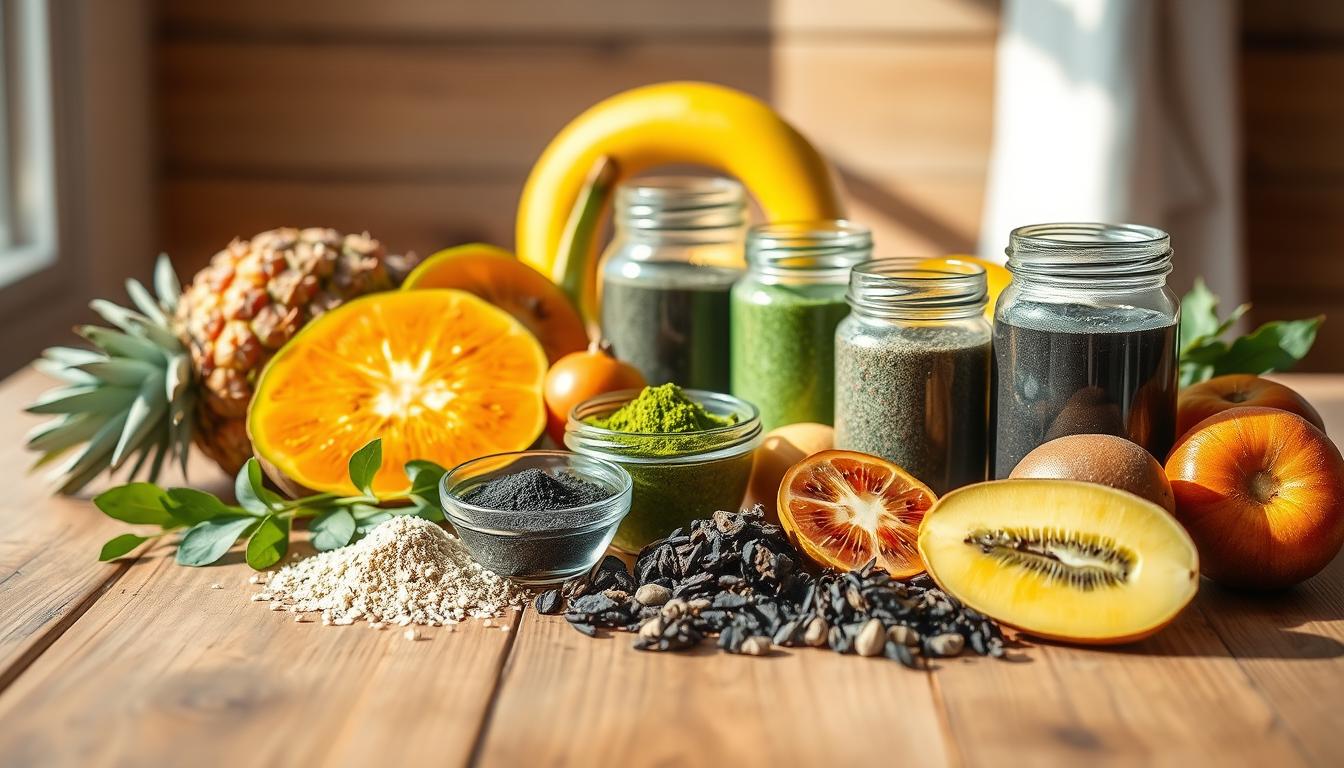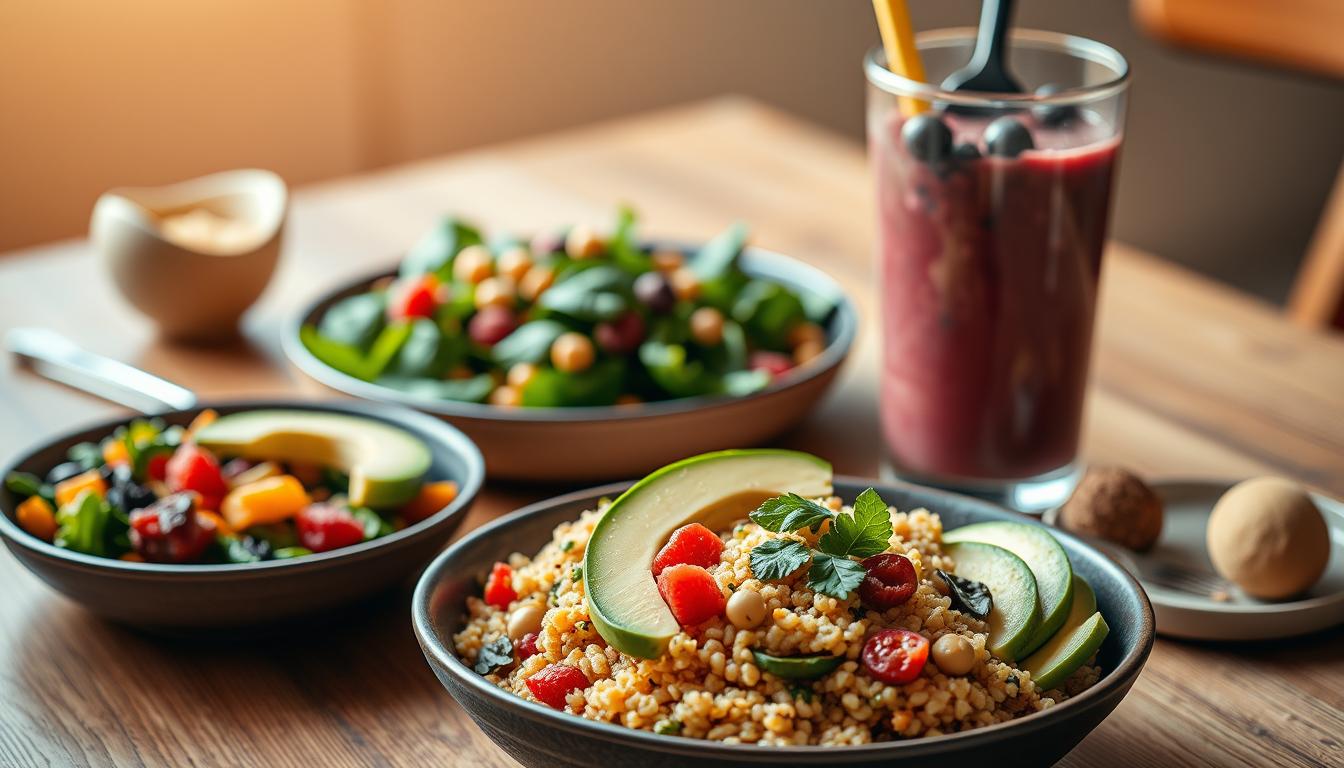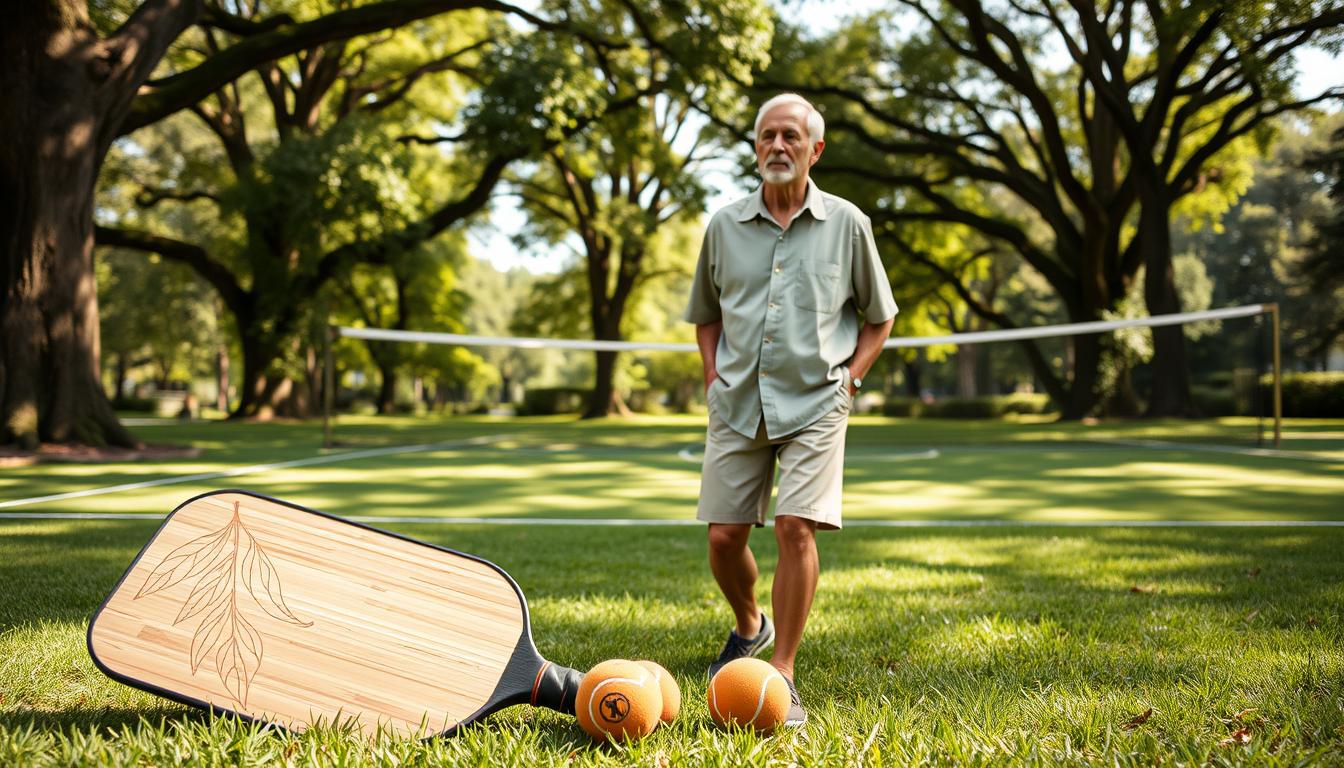What if the secret to improving your pickleball game lies not just in physical training but in your mental state? For senior athletes, mindfulness meditation offers a path to enhanced focus, reduced stress, and ultimately, better performance on the court. As more players over 50 integrate mindfulness into their routines, it’s becoming increasingly clear that mental clarity can significantly impact athletic prowess. In this article, we’ll delve into various mindfulness meditation techniques tailored for older pickleball players, revealing how a resilient mindset can transform your game.
Understanding Mindfulness and Its Importance for Athletes
Mindfulness is about being fully present in the moment. For athletes, it’s very important. It helps them stay focused and mentally strong during games.
It helps athletes deal with distractions and negative thoughts. This makes them better at staying focused. It also helps them handle pressure better.
Studies show that athletes who practice mindfulness feel less stressed and more confident. It helps them perform better in sports like pickleball. By using mindfulness, athletes can get an edge and feel more focused and calm.
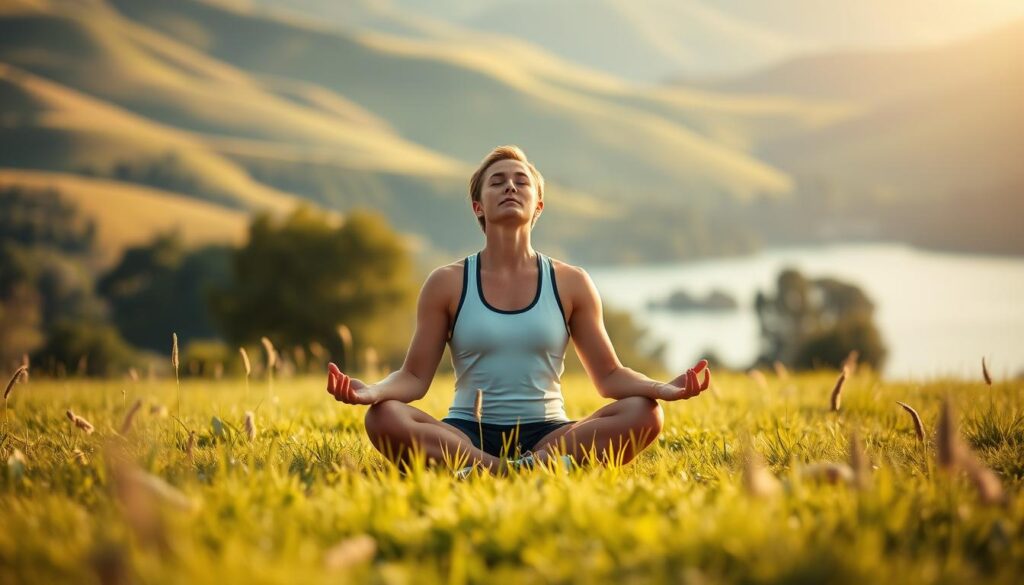
The Role of Mindfulness in Enhancing Pickleball Performance
Mindfulness is a key tool for athletes looking to improve their pickleball skills. It helps players stay focused and clear-minded, making it easier to handle tough situations. Being fully present in the game helps players hit their shots more accurately and react faster.
Mindfulness helps players stay focused on the game, reducing distractions. This focus leads to better decision-making and quicker actions during intense matches. It also helps manage stress and keep calm, even when emotions run high.
Adding mindfulness to regular practice can really boost performance. Players who take time to breathe and center themselves can tackle game challenges more effectively. Mindfulness builds resilience, helping athletes stay strong under pressure.
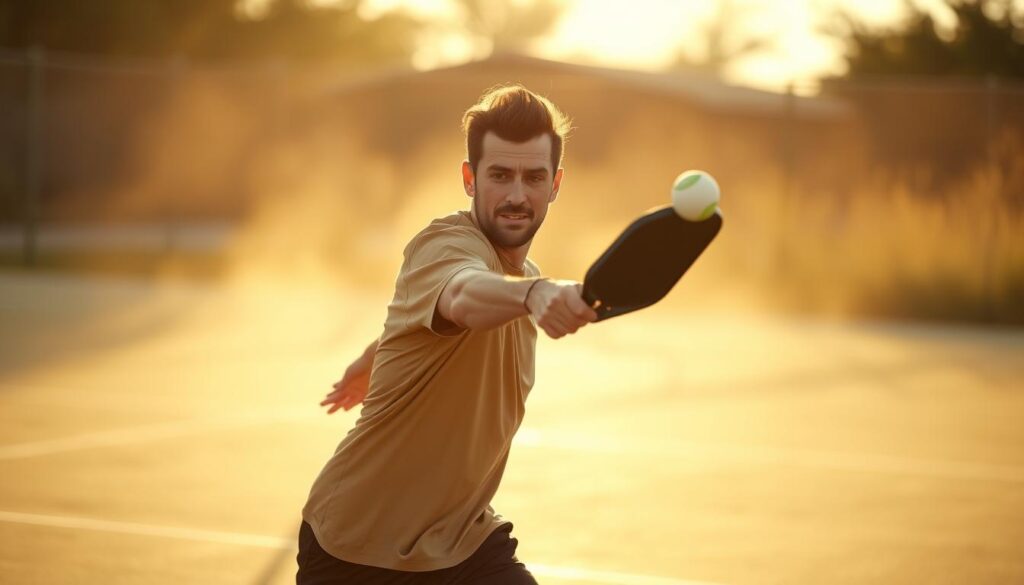
Benefits of Mindfulness Meditation for Players Over 50
Mindfulness meditation does more than just relax. It’s a key tool for older athletes to reduce stress and boost well-being. It helps them understand their thoughts and feelings better, leading to stronger emotional control.
This control is crucial for staying calm and focused under pressure. It’s especially important for older athletes who face tough challenges on the court.
Adding mindfulness to daily life can sharpen mental clarity. This leads to better focus during games. Regular meditation helps older athletes deal with the physical and mental demands of sports.
It’s all about being ready for anything that comes up. This flexibility is key to success in sports.
Mindfulness meditation also helps players stay present. Many find they can play more freely and naturally. This improves their performance on the court.
| Benefit | Description |
|---|---|
| Reduced Stress | Calming the mind and lowering anxiety levels for better performance. |
| Increased Focus | Enhancing concentration during matches, leading to more effective play. |
| Emotional Resilience | Coping better with the emotional ups and downs of competitive sports. |
| Psychological Flexibility | Ability to adapt to unexpected challenges during games. |
Mindfulness Meditation Techniques for Pickleball Players Over 50
Mindfulness is key for pickleball players over 50 to improve their game and feel better. It helps with focus, lowers stress, and connects you with your body. Focused breathing and the body scan are two great ways to boost your game.
Focused Breathing for Enhanced Concentration
Focused breathing is a must for athletes wanting to improve their focus. Taking slow, deep breaths helps calm nerves and clear your mind. It keeps you in the moment, leading to better decisions on the court.
Body Scan for Stress Relief
The body scan is another great mindfulness tool. It involves checking your body for tension and letting it go. Doing this before games or during breaks helps manage stress and stay connected with your body. These practices help players perform better and enjoy their game more.
Incorporating Vegan Mindfulness Meditation into Your Practice
Adding vegan mindfulness to your meditation can make your lifestyle healthier. It sharpens your awareness and boosts focus. This mix of plant-based eating and mindfulness improves your mental state and physical performance.
Mindful eating is a great way to enhance your meditation. Enjoying your meals slowly can turn eating into a meditation. It helps you connect with your food, improving your health and mental clarity.
Practicing vegan mindfulness means making conscious choices and meditating regularly. Create a routine that links your diet to mindfulness. Reflect during meals, feeling thankful for the food’s benefits. This strengthens your mental game, both on and off the court.
Easy Mindfulness Exercises to Try Before a Match
Adding mindfulness exercises to your pre-match routine can boost your performance. Simple practices can help you refocus and calm down before playing. Here are some techniques to try:
- Mindful Warm-Ups: Do some light exercises while focusing on your movements and breathing. This helps you stay aware and relax.
- Breath Awareness: Take a few minutes to just breathe. Breathe in deeply and out slowly. This can help you relax and concentrate better.
- Brief Body Scans: Before the game, mentally check your body for any tight spots. This technique can help you release tension and stay focused.
Using these mindfulness exercises regularly can improve your focus during games. It makes you more ready and engaged as an athlete.
Visualizing Success: The Power of Mental Imagery
Mental imagery is key in sports, especially for pickleball players. It helps them imagine winning plays and strategies. This boosts their confidence and builds a strong mindset for success.
Top athletes use mental imagery to picture their success. They imagine perfect serves or guessing their opponents’ moves. These mental rehearsals prepare them well.
Using mental imagery in training connects the mind and body better. Players see themselves winning, which strengthens their neural pathways. This makes their actions feel more natural and automatic.
Tips to Maintain a Mindful Focus During Competing
Maintaining focus in competition needs effort and practice. Athletes can boost their game by using techniques that keep them in the moment. Taking deep breaths helps keep attention on the present, cutting down on distractions.
This simple act can greatly improve mental toughness. It lets players refocus, even when the game gets intense.
Doing quick body checks between plays also helps. It’s about noticing how you feel and what you’re thinking. This way, players can spot and manage any stress or anxiety that might affect their game.
Positive self-talk is another key strategy. Using encouraging words helps athletes stay strong mentally. It keeps them focused on the game, not on past mistakes or worries about the future.
It’s also important to enjoy the game and the journey. This mindset lowers stress and builds resilience. Regular practice of these strategies can improve focus, boost competitive spirit, and make the game more enjoyable.
How Mindfulness Can Help You Stay Calm Under Pressure
Athletes often face intense moments during matches, leading to heightened performance anxiety. Mindfulness techniques can provide effective strategies to remain calm under pressure. These methods enable players to regain focus and enhance their performance even in critical situations.
Techniques for Resetting Focus
One of the most effective mindfulness techniques is focused breathing. This method involves taking deep, deliberate breaths to center one’s thoughts and emotions. Another approach is the body scan, where athletes mentally check in with different parts of their bodies, identifying areas of tension. Both techniques serve as powerful reset buttons, helping individuals reestablish their focus when distractions arise.
Managing Performance Anxiety with Mindfulness
Mindfulness plays a pivotal role in managing performance anxiety. Implementing mindfulness techniques within athletic routines can help players cultivate a sense of calm. Regular practice fosters an increased awareness of anxiety triggers, allowing athletes to confront these feelings instead of letting them undermine performance. By reinforcing mental resilience, mindfulness empowers players to stay focused and perform at their best, regardless of the pressure they encounter.
Building Mental Resilience Through Mindfulness
Mindfulness helps athletes understand their thoughts and feelings better. This mindfulness practice builds emotional strength. It helps athletes deal with the pressures of sports.
By being aware of their thoughts, athletes learn to handle challenges. They develop ways to overcome obstacles. This makes them stronger both mentally and emotionally.
Mindfulness is a daily habit that helps athletes face setbacks head-on. It lets them see negative thoughts and change their mindset. This boosts their positive thinking.
In sports, staying focused and calm is key. Mindfulness helps athletes do just that. It improves their performance and enjoyment of the game.
Older athletes gain a lot from mindfulness. They face both physical and mental challenges. But with mental resilience, they stay confident and committed, no matter what.
Mindfulness and mental resilience together change how athletes compete and train. They become emotionally stronger. This leads to better performances and a more rewarding sports experience.
The Science Behind Mindfulness and Athletic Performance
Mindfulness research has shown how mental practices can boost physical performance. Athletes use mindfulness to improve their focus and performance. Studies suggest that mindfulness can lead to better focus and decision-making during games.
Research Findings on Mindfulness in Sports
Many studies have found links between mindfulness and better athletic performance. Mindfulness helps improve concentration, emotional control, and stress management. These skills are key for athletes in high-pressure sports like pickleball.
Neuroscience of Mindfulness: Impacts on Focus and Decision-Making
Neuroscience has looked into how mindfulness changes the brain, especially for focus and thinking. Regular mindfulness practice can increase brain areas for emotional control and decision-making. This means athletes can focus better and make quicker, smarter decisions.
By understanding these scientific bases, athletes over 50 can use mindfulness to get ahead and improve their game.
Conclusion
Adding mindfulness and meditation to a pickleball player’s routine can really boost their game and well-being. Techniques like focused breathing and visualization are key. They help players concentrate better, stay mentally strong, and play their best.
As more athletes use mindfulness, they tend to do better in pickleball. Being present and focused can change how much fun you have playing. It makes the game more enjoyable and helps you grow as a person.
Using mindfulness in sports is a great way for players over 50 to improve and enjoy the game more. It’s all about finding a mindful mindset. This journey can lead to better performance and a more fulfilling experience.


